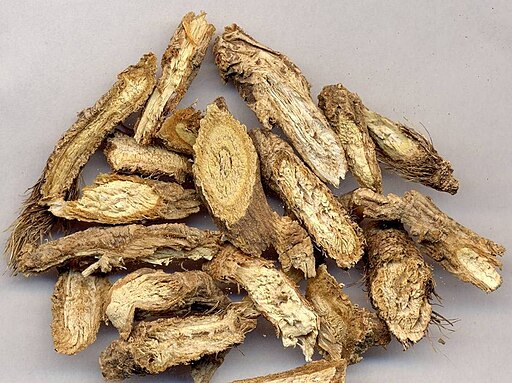
According to Chinese medicine, we are now in peak Spleen time. This is the time of year, often referred to as Indian summer, when the days are warm, dry and still. There is an air of solidity and gravity, as if the world finally decided to slow down, relax, and enjoy the fruit of all its labours. It is a time of pause and reflection before the world subtly tilts on its axis and we are nudged into autumn.
If you have a weak Spleen, this is when it would be most advantageous to strengthen it, as Spleen tonics have their most powerful effect. And atractylodes rhizome, our herb of the month, would be a great herb of choice for that purpose.
You may have noticed that I have been capitalizing the world ‘Spleen’ so far in this article. This is because the Spleen, as described in Chinese medicine is quite different from the spleen in Western medicine. In Western medicine, the spleen is a mostly useless organ, which has some ability to filter blood and buffer the immune system. However, in Chinese medicine, the Spleen includes the functions of the pancreas and is considered a major organ for digestion, as well as for the strength of your immune system and the generation of Qi for your entire body.
So, what are some signs that your Spleen may be weak and in need of strengthening? You would tend to feel fatigued often. This fatigue is often not just a feeling of tiredness, but also of heaviness, like you are dragging the world behind you. Your appetite may be low and you might experience bloating afterwards. When you eat, your food may not be digested well and you can still see bits of it in your stool, which may tend towards diarrhea. If you don’t have diarrhea, your stool may be “sticky”. (You need to wipe a lot, and there may be a smear in your toilet after you flush. Sorry for the graphic images!) Your immune system will tend to be weak, so you will catch colds and flus easily. You may also tend towards anemia, or have low blood volume.
These are the kinds of health conditions that are not severe enough to contact a doctor, but if you have them, you definitely don’t feel well. If you were to contact a doctor, he would also have little ability to help you. There are very few Western herbs that might nudge your Spleen in the right direction. But this particular area of personal health, is where Chinese medicine really shines. The Chinese herbal pharmacopia includes at least a dozen herbs that can be used to strengthen Spleen functioning, and actractylodes root, the herb we’re focusing on this month, is one of them.
Atractylodes root is warming and drying, the perfect combination of properties to stabilize an organ which tends towards cold and dampness. It is used to strengthen digestion, resolve diarrhea, improve appetite, reduce fatigue, and dispel edema. It can even be used to help prevent miscarriage, particularly for women who feel a draggy sensation in their pregnancy, or who tend towards unexplained bleeding. Atractylodes rhizome will give your body strength and support as you carry your baby to term.
Unfortunately, warming and drying herbs like atractylodes can tend to cause “heat” to develop in your body. This is why they are best combined with more cooling herbs to balance their effects. This will allow you to take them long term with fewer side effects. Our Chinese Bitters tincture contains atractylodes rhizome, and its function there is to add support to your spleen while you open up the ducts of your liver to remove any heat or stagnation there. Atractylodes root is also in our Meta Plus tincture, where it is used to more directly strengthen the Spleen. Here, it is paired with more cooling herbs, such as the neutral poria mushroom, and the cooling scutellaria root and cassia seeds to balance its warming and drying nature.
Do you think atractylodes rhizome might be right for you? Consider trying either of the above two tinctures, prepared with care at our Toronto facility. And if not, be sure to bask in the warm, dry energy of Spleen time before the cold and dampness of winter sets in. May you experience peace as summer slowly winds itself down.
About the Author: Rebecca Wong has a BA in English Literature from the University of Waterloo and has been working in the herbal business since 2000. She studied at the Ontario College of Traditional Chinese Medicine under respected authorities Paul Des Rosiers and Vu Le, and graduated from the East West School of Planetary Herbology under Michael Tierra. She received training as a yoga teacher at The Branches in Kitchener/Waterloo, and therapeutic yoga teacher training from the School for Somatic Soulwork under Deniz Aydoslu. She now teaches yoga for anxiety, depression and burnout at Rebecca's Restful Yoga Studio in Toronto.
